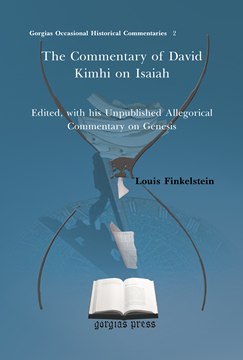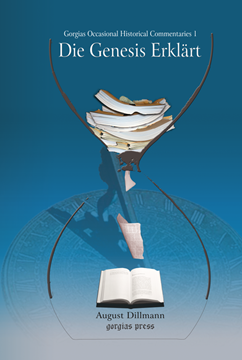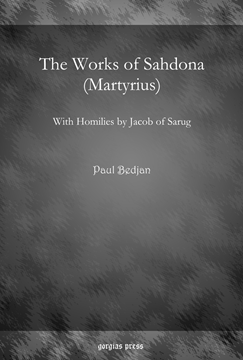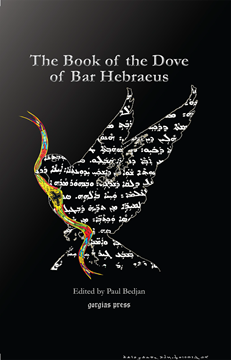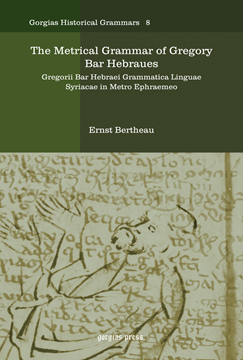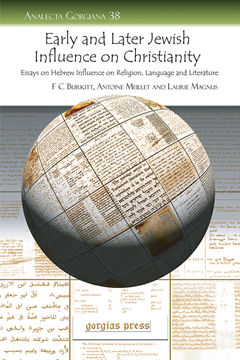The Earliest Records of Christianity
With a New Introduction by George A. Kiraz
Series: Analecta Gorgiana 1
ISBN: 978-1-59333-500-7
This reprint of Sukenik’s article “The Earliest Records of Christianity” is presented as the first volume of Gorgias Press’s Analecta Gorgiana series with a new introduction by George Anton Kiraz. This fully illustrated archaeological abstract is sure to be of interest to readers concerned with the archaeology of the area around Jerusalem, as well as those interested in early artifacts of Christianity.
$39.00 (USD) $23.40 (USD)
The Improvement of the Moral Qualities, an Ethical Treatise of the Eleventh Century by Solomon ibn G
Printed from an Unique Arabic Manuscript, Together with a Translation, and an Essay
Series: Kiraz Theological Archive 23
ISBN: 978-1-59333-673-8
The original manuscript of the Arabic Improvement of the Moral Qualities was examined by Wise in order to prepare this edition. The text includes a copy of the original Arabic, a translation into English, and an essay on the place of Solomon ibn Gabirol in the development of Jewish ethics.
$127.00 (USD) $76.20 (USD)
The Commentary of David Kimhi on Isaiah
Edited, with his Unpublished Allegorical Commentary on Genesis
Series: Kiraz Commentaries Archive 2
ISBN: 978-1-59333-675-2
The commentary of Rabbi David Kimhi (1160-1235) on the prophet Isaiah, chapters 1-39, in a Hebrew critical edition, makes up the main portion of this study. Presented with an English introduction by Louis Finkelstein, the commentary also includes a useful biography of Kimhi in English, an introduction to his commentary, and a presentation of a previously unknown treatise on Genesis in Hebrew.
$168.00 (USD) $100.80 (USD)
Die Genesis Erklärt
Series: Kiraz Commentaries Archive 1
ISBN: 978-1-59333-676-9
The fourth German edition of August Dillmann’s commentary on Genesis fits proudly in the Gorgias Occasional Historic Commentary series. Based on the influential grounding of the University of Tübingen training received by the author, this historic commentary contains both philological and theological insights still valued today.
$201.00 (USD) $120.60 (USD)
The Works of Sahdona (Martyrius)
With Homilies by Jacob of Sarug
By Paul Bedjan
ISBN: 978-1-59333-677-6
Bedjan presents Sahdona’s Book of Perfection, a significant resource for the study of East Syrian monasticism, and some shorter works. Also included are several homilies by Jacob of Sarug on Jesus, Mary, virginity and the Council of Nicea.
$302.00 (USD) $181.20 (USD)
The Book of the Dove
Edited by Paul Bedjan
ISBN: 978-1-59333-678-3
The Book of the Dove is the ascetical guide composed by Bar-Hebraeus for aspiring hermits. It concerns the training of the body and the soul for ascetical life. The spiritual rest of the perfect is also described, along with a spiritual autobiography of Bar-Hebraeus himself.
$139.00 (USD) $83.40 (USD)
The Metrical Grammar of Gregory Bar Hebraues
Gregorii Bar Hebraei Grammatica Linguae Syriacae in Metro Ephraemeo
Series: Kiraz Historical Grammars Archive 8
ISBN: 978-1-59333-681-3
One of the noted linguistic works of Gregory Bar-Hebraeus, this Grammar of the Syriac Language is presented here in the original Syriac along with a Latin translation by Ernst Bertheau. The text is fully annotated, also in Latin, giving it a wealth of information on ancient languages.
$122.00 (USD) $73.20 (USD)
Hebrew Studies in the Reformation Period and After
Their Place and Influence
Series: Analecta Gorgiana 37
ISBN: 978-1-59333-691-2
This essay on the history of how the Hebrew Bible was considered during the Reformation period takes the reader into areas largely unexplored. In addition to the Bible, the Kabala is brought into the discussion. Box traces the development up to the advent of the critical study of the Bible which continued to be controversial when his study was published.
$48.00 (USD) $28.80 (USD)
Early and Later Jewish Influence on Christianity
Essays on Hebrew Influence on Religion, Language and Literature
Series: Analecta Gorgiana 38
ISBN: 978-1-59333-692-9
Selected from the essays of the influential volume “The Legacy of Israel,” the three contributions in this volume explore early and later Jewish influence on Christianity. Written by F. C. Burkitt, A. Meillet, and L. Magnus, the articles consider the patristic period and modern European literary usage of Hebrew scripture and tradition.
$48.00 (USD) $28.80 (USD)
The Origin of the Modern Syrian
Series: Analecta Gorgiana 39
ISBN: 978-1-59333-693-6
An extremely provocative text, Bishara pleads the case of the Arab-American to be seen and treated as equal members of American society. An insightful peek into Arab-American self-identity around the turn of the 20th century, Bishara’s essay is of interest to ethnographer and historian alike.
$44.00 (USD) $26.40 (USD)


